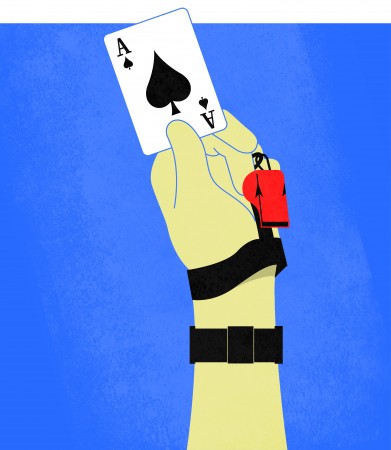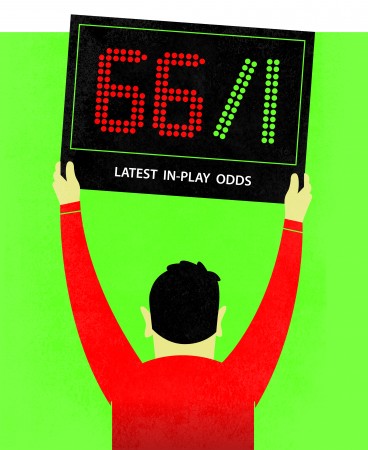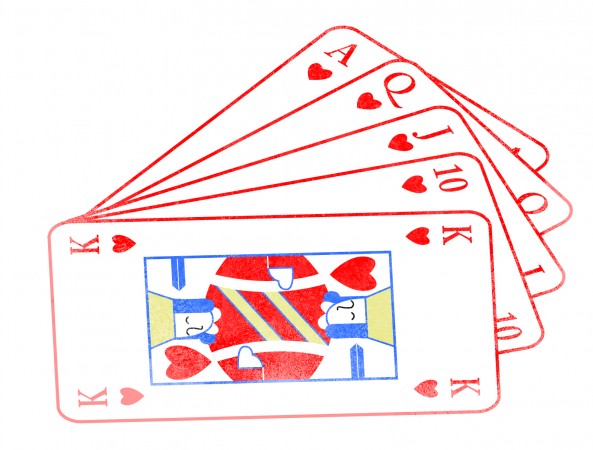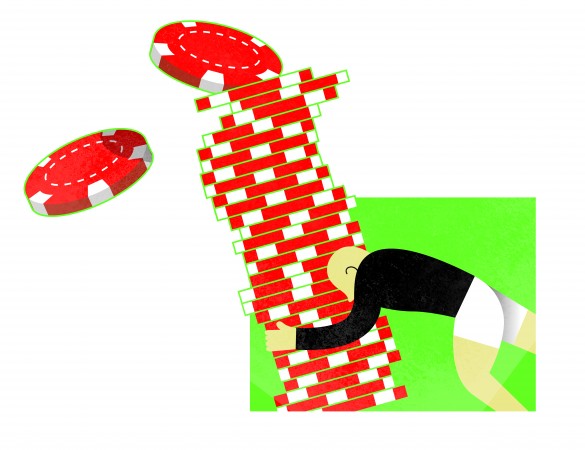Rugby World look at the role of betting in rugby, from the social issue affecting individuals to the real risk of match-fixing. This special report was first published in the April edition of the magazine
Gambling in rugby: a Rugby World investigation
Facing up to gambling addiction
“I SAT on the bridge waiting for the next train, just psyching myself up to jump in front of it,” Mark Potter remembers.
Right on the edge. This was a young man at his lowest ebb. A compulsive gambler finally realising how strong the stranglehold of addiction was around his neck and thinking that all he could do was end it all. But he couldn’t do it.
Today Potter – now a retired second-row who earned decent if not spectacular money playing in the National Leagues and semi-pro in Ireland – works alongside EPIC Risk Management, a company that specialises in assessing the risk of problem gambling for professional organisations and setting up support networks for those within it affected by addiction. They have worked with the Rugby Players Association (RPA) to roll out their largest ever education programme, in a move everyone hopes will provide clubs, academies, players and management with as much information about addiction as possible, as well as aid professionals in the game who may previously have hidden from their own gambling problems.
Potter can now talk calmly about all the wrong he had done and how close he came to jumping, but the proud member of Liverpool St Helens RFC wasn’t always renowned for his control. “I always knew I had a problem,” says the 35-year-old father of three. “Ever since my late teens I’d put money on. I was playing at a reasonable level of rugby and making quite good money – I knew I’d never play for England, but I was playing for enjoyment and I was playing to make money. I had built up a big debt (around £20,000) by my mid twenties and then I met my wife.
“She’s Irish and together we moved over after I got an offer to play out there. I thought it was all good. I was keen. But then I started up again. Things got bad.”
Potter went to great lengths to cover up his problems while the family were in Ireland, telling his wife all was well as the bills went unpaid and he went on searching for the buzz of another big win. He looks back on a time when he thought it was acceptable to rip off his own rugby club to pay his debts. But it’s impossible to hide forever. His wife found out and he moved back to England on his own, ashamed. The problem did not go away.
 He continues: “It doesn’t matter if you’re on £100k a week or £100. You will spend whatever’s reflective of your income, whatever you’ve got. Eventually I ran out of people to borrow money from. There came the point when I swiped some of my kids’ stuff and sold it, so I could gamble. That was the end of the road. I had to hold my hand up.” That is when the troubled lock headed for the train tracks.
He continues: “It doesn’t matter if you’re on £100k a week or £100. You will spend whatever’s reflective of your income, whatever you’ve got. Eventually I ran out of people to borrow money from. There came the point when I swiped some of my kids’ stuff and sold it, so I could gamble. That was the end of the road. I had to hold my hand up.” That is when the troubled lock headed for the train tracks.
When Potter could not bring himself to commit suicide, though, he made for the sanctuary of his parents’ home. They had been asked for understanding a few times before, hearing how he wanted to change, bailing him out. But this “semi-meltdown” was different from the others. It was time for lasting help.
In 2013, with the help of the RPA, Potter attended the Sporting Chance Clinic – a safe place for gambling addicts to confront their problems, set up by former Arsenal and England footballer Tony Adams. These days Potter is determined to talk – he thinks it helps him – and he wants to advise and guide anyone who faces problem gambling. He knows how secretive and insidious the issue is. He has spoken to groups from clubs in several different sports – he has even privately advised some Premiership rugby players.
What you may not know is that professional sportsmen are three times more likely to be problem gamblers than young men in the general population. That is according to a study conducted by the Professional Players Federation (who work in football, cricket and rugby, as well as with other sports).
According to Rich Bryan, the RPA’s rugby director, there are a few reasons for this. “Gambling is a societal problem, with the UK set up with all the tech and ads, but there are added factors from the point of view of professional sportspeople,” he says. “They potentially have disposable income and these are inherently competitive people we are talking about – they are possibly more likely to ‘chase’ losing bets. In sport there is also the possibility of a ‘herd mentality’ as it seems socially acceptable for many to gamble.
“Whatever the reasons behind it, when we saw the BBC covering this and heard athletes were three times more likely, it acted as a catalyst for us. There was a podcast on this earlier in the year in which the former footballer John Hartson talked about gambling. Something he said really struck a chord: ‘If you are gambling, until you recognise you have a problem, you’ll never get any help.’ This is a problem that can go unnoticed. It can go undiagnosed. In our environment, we have a perception of these being tough players – rugby is tough – and players do find it hard to open up. What we want is for players to open up to their team-mates, to their colleagues and to us.”
Bryan again mentions the work the RPA are doing, talking to clubs and their academies, relying on the sometimes harrowing stories of the experts running EPIC. He mentions Cognacity, the group who look at mental wellbeing, who specialise in talking with people in sport and who run a confidential hotline for any athlete suffering in silence. He also points out that this impassioned drive by the RPA is supported by the RFU and Premiership Rugby, such is the desire to get the game’s prized athletes feeling mentally healthy.
You see, while a few individuals from the pro game have reached out for help for themselves or others – going to someone like Potter – the stigma can still be great. In other sports, a few high-profile names have stepped out and explained their very human flaws. In rugby, gambling is another of those issues rarely aired in public. So when an established player like Willie Ripia speaks out, his words carry weight.
In January 2012, the Kiwi fly-half parted ways with his Super Rugby franchise, Western Force. A former Hurricane and Highlander, Ripia was at the Force wearing the No 10 shirt and hoping to qualify for the Wallabies after three years in the country. But after team-mates had complained that Ripia was taking money from wallets and bags in the changing room, CCTV footage emerged that forced him to quit. Eight months later, Ripia explained to New Zealand’s Sunday News that he had struggled with addiction.
“When I moved to Perth it was so easy to (gamble),” the playmaker said, explaining that he had blown money throughout his Super Rugby career. “You wake up at 7am and the New Zealand trots (horse racing) start and you go to sleep at 11pm and the South African and English trots are happening.
“I found out that life is all about perception and I found that gamblers are really good at throwing a certain perception out there, but when you get caught, man, s*** hits the fan. It is something that’s not addressed as much as it could (be).”
 Ripia even explained that he had taken kicks in big games after losing money that very same day. He was going for the posts while his mind was churning. Did anyone notice? Steve Symonds, the personal development manager at the Hurricanes, helped Ripia when he eventually returned to New Zealand. For him, gambling is the biggest threat to professional players, simply because it is so difficult to detect.
Ripia even explained that he had taken kicks in big games after losing money that very same day. He was going for the posts while his mind was churning. Did anyone notice? Steve Symonds, the personal development manager at the Hurricanes, helped Ripia when he eventually returned to New Zealand. For him, gambling is the biggest threat to professional players, simply because it is so difficult to detect.
“The hardest thing is that gambling is the easiest thing to hide. If it’s alcohol or drugs, you can pick it up. But with gambling often no one knows and they might not come to talk about it until they are absolutely desperate. I’ve had players in talking about their problems, often that’s a trigger for disclosure. But they never fully bloody disclose! So when they say, ‘I think I have a problem’, it’s probably a huge problem by then.”
Symonds knows of a few elite-level players with issues but he urges more people to talk. “High-profile cases have hardly been followed up. I dealt with Willie when he got back here (from Australia) because he’d been in our environment previously. I spoke with his mum and ex-partner. That was a terrible case; a pure addiction model. We’ve done a few bits about it, but if I had my way he’d be speaking to every club here.”
Support is there if people want it. Symonds understands the social and family issues some young players are burdened with and has even been a signatory on player’s bank accounts. His door is open.
Because unchecked, gambling problems ruin lives. They can certainly ruin careers. And sometimes the need to take a punt spills over into your own game. Gambling problem or not, people within elite rugby need to be aware of what they can and cannot bet on.
 Betting Rules within rugby
Betting Rules within rugby
ON THURSDAY 11 December 2014, Leicester Tigers defence coach Phil Blake walked into the Grosvenor Casino in Leicester, where he was a registered member, and placed four separate bets on two self-service betting terminals.
Each terminal allowed a maximum bet of £200 at a time, so Blake placed one bet of £200 and then one bet of £100 on each terminal, with a total stake of £600. Every one of the bets was on his side’s match-up with Toulon in the European Champions Cup, which was to be played the following Saturday.
With these spread bets, Tigers had a handicap of +18.5 – meaning Blake would win his bets either if Leicester won, or if Leicester lost by fewer than 19 points. In the end Toulon won the contest 23-8 and Blake made himself a tidy profit of £369.24.
Then on Sunday 8 March 2015, Blake placed four more bets – this time fixed-odds bets on Tigers beating Newcastle Falcons – and again fed in £600 across the two machines. When Tigers duly won 16-12, he profited again, this time to the tune of £300.
Sounds harmless? Well, in May 2015, an RFU disciplinary panel found that Blake was in breach of their Regulation 17, which prohibits a ‘connected person’ from placing a wager on any ‘event’ and receiving any proceeds from that wager. Blake had been discovered after an employee of the casino noticed the abnormal spike in bets on these terminals on the two occasions. He realised the bets were on the local Premiership side, and once he checked back through the CCTV footage and cross-checked the Tigers website, the jig was up.
Blake was ordered to fork over his profits of £669, to pay additional costs of £500, and to undergo an anti-corruption learning programme before being allowed to return to the sport. He would also have to serve a six-month ban from rugby.
This was the first-ever case of a professional within the game of rugby being sanctioned for betting and the ban was the biggie. Blake appealed, but it was thrown out. He already knew he was parting ways with Leicester at the end of that season, but the former rugby league player and ex-Wallabies skills coach was sent to rugby oblivion for half a year. A precedent was set.
Midway through the 2012-13 season, World Rugby introduced a blanket ban on gambling in rugby for Test and professional players, support staff or officials as part of their Regulation 6, which is what the RFU’s Regulation 17 stems from.
 In World Rugby’s language they state: No Connected Person, Contracted Player(s) or Contracted Player(s) Support Personnel “shall, directly or indirectly, Wager and/or Attempt to Wager on the outcome or any aspect of any Connected Event and/or receive and/or Attempt to receive part or all of the proceeds of any such Wager and/or any other Benefit in relation to a Wager” or be permitted to “Attempt, directly or indirectly, to solicit, offer, induce, entice, instruct, persuade, encourage, agree with and/or facilitate any other party to Wager and/or Attempt to Wager on the outcome or any aspect of any Connected Event”. In short: if you are involved in elite rugby, don’t bet on any rugby and don’t aid those who hope to.
In World Rugby’s language they state: No Connected Person, Contracted Player(s) or Contracted Player(s) Support Personnel “shall, directly or indirectly, Wager and/or Attempt to Wager on the outcome or any aspect of any Connected Event and/or receive and/or Attempt to receive part or all of the proceeds of any such Wager and/or any other Benefit in relation to a Wager” or be permitted to “Attempt, directly or indirectly, to solicit, offer, induce, entice, instruct, persuade, encourage, agree with and/or facilitate any other party to Wager and/or Attempt to Wager on the outcome or any aspect of any Connected Event”. In short: if you are involved in elite rugby, don’t bet on any rugby and don’t aid those who hope to.
Max Duthie, a sports-focused lawyer with Bird & Bird who played for Sale, London Scottish and Cambridge University, puts it simply: “It is a sledgehammer approach. So a person who manages a team who plays in the Championship in England, who would realistically have no ability to influence the result of a match taking place in Argentina, for example, is nevertheless prevented from betting on that match. And I think there’s good reason for that. If you tried to chop it up and say, ‘You can only bet on this rugby, but leave that rugby…’”
You’d be tangled up in red tape? “Yeah, exactly. It would be much easier to have a blanket ban.
“I don’t expect any player to have read through any of the regulations drafted – not unless they’re in trouble – but I think World Rugby is now going to some lengths to increase awareness and education. I think in our competitions (Duthie works with the Guinness Pro12, the RBS 6 Nations and the British & Irish Lions) and certainly with the Six Nations, there will be a provision that says all players, before they participate, will have to do an online exercise. Is that a very sophisticated tool? Of course it isn’t. But it is a foot in the door, to ask are they aware of the risks?”
Duthie admits that some rugby personnel he has explained this to in the past were taken aback. He has worked on huge cases, including the prosecution of the three Pakistani cricketers found guilty of ‘spot-fixing’ and on the ‘Bloodgate’ case. He has seen sporting corruption. He just wants personnel within the game to know all the facts. That’s why EPCR, the Pro12 and the Six Nations now have stand-alone anti-corruption regulations, as of this season. That’s why the Six Nations is monitored for irregular betting patterns and education programmes are rolled out. Those in the game may know not to bet, but do they know telling mates about team selection or injuries is also a big no-no, worthy of serious sanction?
Duthie gives this advice: “There are obviously risks for the sport. At least read a summary of the regs. If you don’t do that, just don’t bet on any rugby. It’s all obvious. But the hardest thing is insider information. Even if somebody says they are absolutely straight up and down and won’t bet, they could still be caught out by telling someone if they’re in or out, who’s looking good in training, whatever it might be. That could be valuable and could mean someone puts a bet on and could damage the sport.”
And that’s the rub. World Rugby have been proactive with their approach to corruption. Indeed, almost every expert on gambling who has been questioned for this feature has praised the governing body for their progressive thinking and strong work on global threats of corruption that they have not even encountered yet, with a spokesperson for the International Centre for Sports Security (ICSS) singling out the Keep Rugby Onside online education campaign for special mention.
Before the 2015 World Cup, the governing body made noises about clamping down on gambling corruption, in any form. They pushed for players to be aware that they cannot share information. It must have sunk in because during the World Cup, according to World Rugby, on two separate occasions individuals from participating teams brought it to integrity officers’ attention that members of the public had been asking questions about their team selection, in their hotels.
World Rugby investigated and concluded that it was just curious fans being nosey, but it was a swift demonstration of education being put into practice and working for the good of the game.
 The spectre of match-fixing
The spectre of match-fixing
Rugby World has just asked Patrick Jay, a betting consultant and former director of trading at the Hong Kong Jockey Club, about the risks he sees for match-fixing in the sport. “Rugby people don’t like it when I say this,” he bluntly states, “but rugby is a tiny sport. If you are going to fix an event it has got to be worth your while. The only way to do it is a) if you can find someone willing to be manipulated, and b) a bookmaker can stand up a bet for a whole load of money that covers you.
“You can bet on the value of sterling versus the dollar – worth billions – and that’s like football. Rugby is like betting on the value of bitcoin (virtual money) versus the (currency of) Guatemala.”
It is a novel way of describing the minimal market that exists for rugby betting. Despite the game stretching further around the globe, into the new territories of Asia and North America, the sport is still a tiny speck on a global betting market that is now worth an estimated US$1.5-2 trillion per annum, according to the ICSS. But Martin Purbrick, head of security for the Hong Kong Jockey Club, which is, he claims, the biggest bookmaker in the world for sheer volume of wagers, takes a slightly different view from Jay. “I’d actually class rugby as medium-to-high risk,” he says.
“Liquidity in the rugby betting market is small, but the integrity risk of a sport is not based on the (global) popularity of it. You don’t look for match-fixing in the English Premier League, you look for it further down the leagues, in lower-tier International matches or somewhere in the women’s game.”
This is why, according to Ben Rutherford, World Rugby’s integrity unit manager, the governing body is taking bold steps. When talking to Rugby World he uses the word ‘when’ rather than ‘if’ when referring to integrity breaches, and he insists it’s a fight the sport must be prepared for. Especially if the sport continues to grow and push into new markets, while gambling technology improves and updates.
“This (match-fixing) may not be a particular risk for rugby now – thankfully we’re not traditionally a betting product – but we’re not immune to the problem. We have to continue pushing education,” says Rutherford. “We have used the monitoring agency Sportradar for the last three years now, (assessing betting data) on all our sevens, U20s, qualifiers, working across most competitions. We’re in touch fairly regularly.
 “During the Rugby World Cup we had 24-hour access and they would alert us if there were any red flags. We had a number of integrity officers and help from personnel from the International Olympic Committee, England Cricket Board, horse racing and others. Betting volumes during the World Cup were up 30-40% compared with 2011. It was different from New Zealand because of the increase in betting operators – and New Zealand only really has one as it’s more heavily regulated there than in the UK – the technological changes and the time zone change.”
“During the Rugby World Cup we had 24-hour access and they would alert us if there were any red flags. We had a number of integrity officers and help from personnel from the International Olympic Committee, England Cricket Board, horse racing and others. Betting volumes during the World Cup were up 30-40% compared with 2011. It was different from New Zealand because of the increase in betting operators – and New Zealand only really has one as it’s more heavily regulated there than in the UK – the technological changes and the time zone change.”
Rutherford goes on to explain that the big-event handling of the Olympics should be similar, as the IOC’s regulations are “effectively the same as ours”. Education for players, support staff and match officials will continue to be the big push from the body.
The Sevens World Series does pose some interesting integrity challenges as it passes through gambling hotspots like Las Vegas, Hong Kong and Singapore. World Rugby work hard to enforce their online education programme, reprimanding those who do not comply, but there are unique issues to contend with during the series, like concerns over literacy amongst players – both in terms of language and their experience with computers – or the turnover of players amongst nations whose stars can be enticed away to play professionally outside of the circuit.
However, Rutherford feels that the work done on the sevens series by integrity officers to safeguard players from the risks of approach by corrupt agents is adequate – and certainly logistically easier than at a World Cup, which is spread across a whole nation over a matter of weeks. It’s easier to keep an eye on teams when they are all in one place for one week, he says.
Yet it is on the very points of security and compliance of the lower-tier athletes that Rob Nichol, executive director of the International Rugby Players Association and CEO of the NZRPA, takes issue.
“Sevens is the risk area,” Nichol insists. “Security around hotels is substandard. I was in Wellington for the sevens there and I was able to walk into the hotel and onto New Zealand’s floor without being challenged or questioned. If this was cricket I’d have been stopped plenty of times. Now I know we have a different, more laid-back culture in New Zealand and maybe someone who knew me saw me, but in South Africa, for example, the hotel security is pretty intense. You’ve got to put that through everything.
“Then there is the case of the haves and the have-nots. You have an elite group of teams who are all over their players, taking responsibility for their contractual models and their high-performance needs. They have mature relationships. Then at the other end, it’s like the Wild West. If one group is supporting young players and then the others (lower-tier teams) see a big new sponsor come in (for an elite team), when they haven’t been paid for three months and they don’t feel respected, they would get angry. We are dealing with these cases right now.“World Rugby are making good progress (with their education work), but we can always do better.”
 It is a point that writer John Daniell reiterates when we talk about his new novel, The Fixer, in which a veteran Kiwi fly-half out in France is enticed into match-fixing. Much of the book is based on Daniell’s experiences as a player toiling through the early days of professionalism in Europe. Except, that is, with the issue of throwing games. “I never saw any of that when I played. But I do think there is fertile ground for it. Money has changed the face of the game. When I played as the game went pro, everyone on the team got paid the same. Now you can have someone on a contract like Dan Carter’s and someone not getting a tenth of that. It’s a threat.”
It is a point that writer John Daniell reiterates when we talk about his new novel, The Fixer, in which a veteran Kiwi fly-half out in France is enticed into match-fixing. Much of the book is based on Daniell’s experiences as a player toiling through the early days of professionalism in Europe. Except, that is, with the issue of throwing games. “I never saw any of that when I played. But I do think there is fertile ground for it. Money has changed the face of the game. When I played as the game went pro, everyone on the team got paid the same. Now you can have someone on a contract like Dan Carter’s and someone not getting a tenth of that. It’s a threat.”
Daniell’s biggest bugbear is over the way Pacific Islands players, in particular, are allowed to be treated. He expresses disgust at the slumlord-like mentality of some “maniac” club owners in Europe, who are just looking for a pound of flesh. If the powers-that-be continue to allow a huge disparity between the pauper players from the lower tiers and the well-organised elite, he suggests those are the very same players match-fixers would be flirting with.
Purbrick agrees that a cocktail of disillusionment and being skint makes someone an easy target for gangsters. “Patrick Jay always used to say, ‘The betting market is a scene of the crime’. You have to look at what leads to the crime. It’s not difficult – someone pulls up to an athlete in a sports car, offers to buy them a beer. We’ve seen it with young jockeys: someone is approached by a good-looking girl, they are offered more money than they have ever had and they get carried away.” Jay says something else interesting: “Never forget you can always rely on 25-year-old boys acting like 25-year-old boys.” He says this while describing low-level shenanigans by rugby players, a great distance from match-fixing, but the implication here is: young athletes can indeed get carried away.
Conclusion
It is clear that knowing the limits with gambling is essential. Richard Watson, the programme director for the UK’s Gambling Commission, sums it up neatly for any personnel working at the top-end of the game when he says: “Don’t bet on rugby, don’t pass on inside information such as details about injuries or selection, don’t accept money or gifts from someone in return for inside information or underperforming, don’t attempt to fix a match, and make sure you report any suspicious activity or approach.”
Whether or not you think the threat of match-fixing in rugby union is tiny or enormous, it must be insisted that fine work is already being done by the sport’s governing body (see integrity.worldrugby.org). Yet, perversely, the real risks to the sport may not come from a lack of vigilance or foresight – they may come instead, some insist, from the people being left behind in rugby’s march through professionalism. We cannot forget the ‘have-nots’.
Of course it is much harder to sum up the very personal and potentially devastating impact of problem gambling with a similarly short and snappy sentence. So please, if you are or know anyone who is struggling because of this illness, seek help.






 Betting Rules within rugby
Betting Rules within rugby The spectre of match-fixing
The spectre of match-fixing